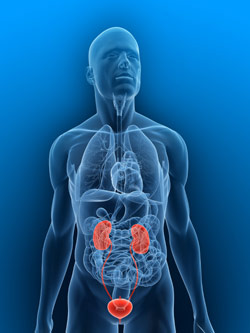
Kidneys and Bladder Problems / Stones
Water is so important to the kidney and bladder health. Do you know that people who do not drink enough water can easily develop bladder and kidney disorders due to the heavy concentration of urine that is passed?

Bladder
It almost seems like a paradox. The bladder aids in the passing of fluid from our bodies. Yet, to remain healthy, it needs water. The urinary bladder is a hollow organ made up of elastic muscle fibers, which allow it to expand without damage. Ordinarily, the bladder has the capacity to hold up to 750ml of fluid. According to the amount of fluid collected, pressure is exerted on the walls of the bladder and, as it mounts, this triggers the feeling of needing to pass water, or urinate. A bladder infection (or urinary tract infections, UTI), caused by bacteria getting into the urine, creates the same urge, but often the patient is able to produce only a few drops of water while suffering pain and discomfort. This discomfort is avoidable. Drinking the recommended 6-8 glasses of water a day will keep the bladder active and bacteria-free. Also, avoiding coffee, tea, carbonated beverages and alcohol can help, as they irritate the bladder and cause a slight amount of bleeding to occur. When bleeding occurs, bacteria may enter the blood vessels.
If a UTI is left untreated or undetected, it can turn into a kidney infection, as the bladders are connected to the two kidneys through ureters. Both can be treated with antibiotics, but as the infection passes to the kidney, lower back pain may develop as well, making a need for pain medication. Which leads us to kidneys...
Kidneys/Kidney Stones
While they don't sound as important as the heart and lungs, kidneys are very important to our health. The kidneys, along with the liver and or urinary tract rid our body of waste materials. If the kidneys were to stop operating for only two days, it would cause a retention of metabolic toxins, and then uremia would set in. The accumulation of waste products, normally excreted in the urine, would cause metabolic poisoning.





